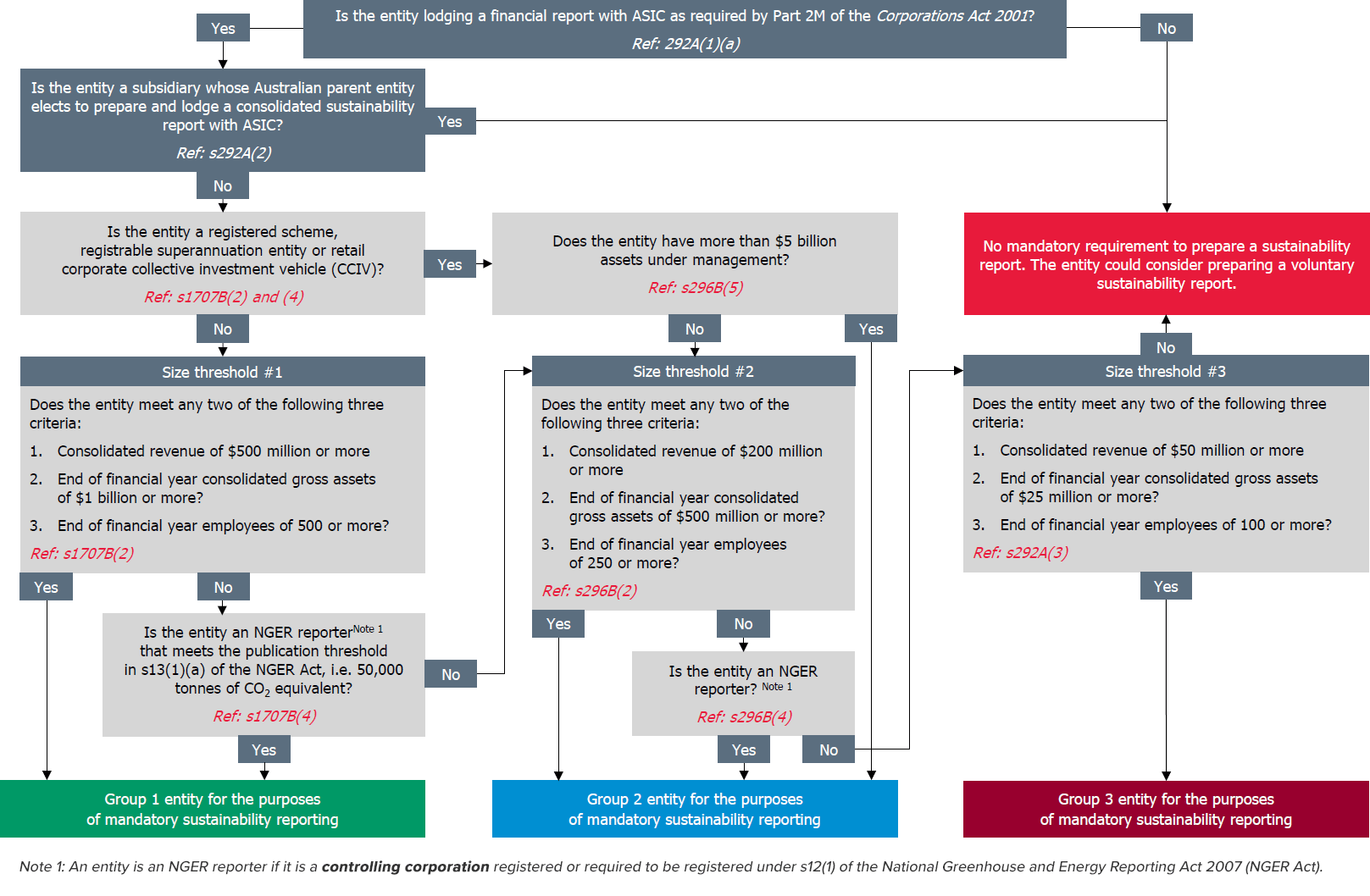Is sustainability reporting required in half-year financial reports?
No. Section 292A(1) requires a sustainability (climate) report for a financial year. Section 292A is contained within Division 1 of Part 2M, which has been expanded to cover annual financial and sustainability reports. No such change has been made to Division 2, which deals with half-year reporting.
What are the contents of a sustainability report?
As noted above, the legislation requires a sustainability report which requires the following (refer to section 296A):
- The climate statements for the year
- Any notes to the climate statements
- Any statements that the Minister determines by legislative instrument concerning environmental sustainability and related notes (not applicable at the time of writing)
- Directors’ declaration about the above.
Climate statements are those required by sustainability standards issued by the Australian Accounting Standards Board (AASB).
Notes include those required by the sustainability standards, those required by the Ministerial legislative instruments, and the additional disclosures specified in section 296D.
Section 296D requires the climate statements and notes for the entity to disclose, as required by sustainability standards:
- Any material financial risks and material financial opportunities relating to climate
- Any metrics and targets relating to climate, including those relating to Scope 1, Scope 2 and Scope 3 GHG emissions (including financed emissions for Scope 3)
- Information about the governance of, the strategy of, or risk management by the entity in relation to the risks, opportunities, metrics and targets referred to above.
Entities must refer to sustainability standards to determine whether there are material financial risks and opportunities relating to climate. These section 296D disclosures appear redundant because they specify disclosures already required by the sustainability standards.
Global average temperature scenario analysis
Section 296D(2B) requires the scenario analysis to be carried out using at least both of the following scenarios:
- Where the increase in the global average temperature well exceeds the increase mentioned in subparagraph 3(a)(i) of the Climate Change Act 2022 (i.e. 2°C above pre-industrial levels)
- Where the increase in the global average temperature is limited to the increase mentioned in subparagraph 3(a)(ii) of the Climate Change Act 2022 (i.e. limit the temperature increase to 1.5°C above pre-industrial levels).
Australian sustainability reporting is, therefore, more prescriptive than IFRS S2 Climate-related Disclosures because it specifies which global average temperature increases must be considered.
Specifying these two mandatory scenarios is intended to ensure entities consider both transition risks and physical climate-related risks:
- Climate-related physical risks are generally associated with higher average global temperature outcomes, such as warmer climate, acute weather-related events or long-term shifts in climate patterns. This is a high global warming scenario, defined as an increase in global average temperature that well exceeds 2 degrees above pre-industrial levels. Therefore, the high global warming scenario analysis should be based on at least 2.5 degrees above pre-industrial levels.
- Climate-related transition risks are generally associated with lower average global temperature outcomes (reflecting efforts to transition to a lower carbon emission economy). This is a low global warming scenario, where the increase in global average temperature is limited to 1.5 degrees above pre-industrial levels.
What if climate-related risks and opportunities are not material?
Section 296B provides an exception from detailed sustainability reporting if an entity (group) has no material financial risks or opportunities regarding climate.
This exception only applies to Group 3 entities.
In other words, during the financial year, the entity, and entities it controls, cannot:
- Satisfy at least two of the following three criteria:
- Have consolidated revenue for the financial year of $200 million or more
- Have consolidated gross assets at the end of the financial year of $500 million or more
- Have employees at the end of the financial year of 250 or more.
- Be an NGER reporter
- Be an asset owner.
What does the climate statement look like if risks and opportunities are not material?
If the entity has no material climate-related financial risks and opportunities, the climate statement must state that there are no material financial risks and no material financial opportunities relating to climate for the financial year. It must also explain how/why this exemption applies to the entity.
Entities must refer to sustainability standards to determine whether there are material financial risks and opportunities relating to climate.
Who sets sustainability standards?
Section 336A provides for the AASB, by legislative instrument, to make sustainability standards (which will include climate disclosures).
The AASB considered various approaches and settled on aligning Australian standards for sustainability reporting as closely as possible with IFRS S1 and IFRS S2. These standards are similarly named AASB S1 (a voluntary standard) and AASB S2 (a mandatory standard) and were issued by the AASB on 8 October 2024.
Is the sustainability report audited?
Yes. The legislation requires the sustainability report to be audited (section 301A), and the auditor must conduct the audit in accordance with the auditing standards (section 307AB). The auditor must also reference the sustainability report as part of their independence declaration under section 307C.
The Auditing and Assurance Standards Board (AUASB) must make standards to specify the extent of and provide for the audit and review of sustainability reports. The AUASB has published its final timeline for assurance over the sustainability report. At least initially, some but not all the climate disclosures specified in AASB S2 will be subject to limited assurance (review), progressing to all disclosures subject to audit for financial years beginning on or after 1 July 2030.
Is the sustainability report lodged with ASIC?
Yes. Although not specifically mentioned, section 319(1) requires entities preparing a report for a financial year under Division 1 of Part 2M of the Corporations Act 2001 to lodge that report with ASIC. Division 1 includes the relevant sections that mandate sustainability reports and financial reports, which means the sustainability report must be lodged with ASIC together with the financial report.
Is the sustainability report sent to members?
Yes. The sustainability report is sent to members with the financial report. If sustainability reporting applies to members of companies limited by guarantee, this also applies to them. Sections 316 and 316A have been amended to include references to sustainability reports.
Is the sustainability report considered at the annual general meeting (AGM)?
Yes. Section 317(1) has been amended so that the sustainability report is presented before the AGM along with the financial report, directors’ report, and auditor’s report.
Other legislative requirements
The Bill also introduces requirements in the Corporations Act 2001 to maintain sustainability records, including the place where records are kept.
ASIC also has the ability to direct an entity to take certain actions if it considers statements made in a sustainability report incorrect, incomplete or misleading.
More information
Our sustainability reporting resources contain extensive guidance, including for mandatory Australian sustainability reporting.
Overwhelmed by sustainability reporting? We’re here to help
We understand that navigating the new sustainability reporting legislation probably feels daunting. Determining which entities must report and by when may be a difficult and time-consuming exercise. Our expert sustainability reporting team is ready to guide you through the process and ensure your organisation meets all requirements.



